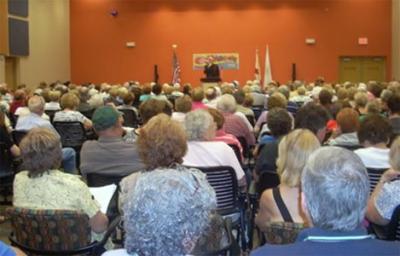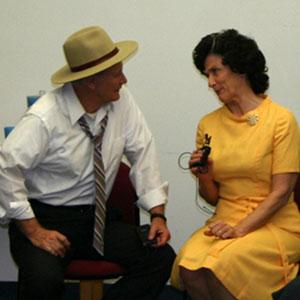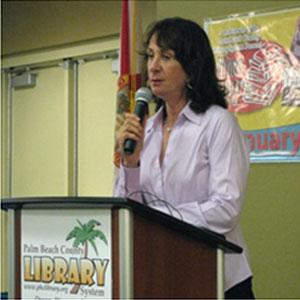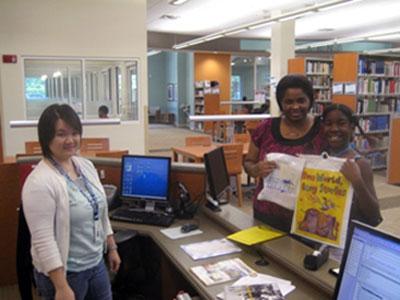If only there was a class in library school on how to select, plan, coordinate, and publicize a library program! Some schools may teach storytelling techniques to future children’s librarians, but not how to organize and prepare for the storytime. Still others may touch on library programming in classes dealing with services to seniors or special populations. Yet, these courses don’t teach the nuts and bolts of providing programs to their patrons, whether for adults or kids. The kind of information a programming librarian does need to know is most likely taught in other university schools—communications, business, and hospitality. How then can libraries help their staff become confident, creative, and effective programming librarians for their organization if they don’t have backgrounds in public relations, marketing, and event planning?
Whether your library is a public, school, special, or academic library, you most likely will provide regular programs and special events at your organization and have a designated staff member or team to plan and coordinate programming.

Training Programs for Programming Librarians
At the Palm Beach County (Fla.) Library System (PBCLS), we have instituted a training program for all new hires and existing programming staff. As a multi-branch public library with a programming librarian at each branch, we wanted all of the programmers to be on the same page in terms of the library’s overall service mission, general goals for programming, and specific policies and procedures. The Systemwide Adult Programming Coordinator is responsible for instructing all staff involved in adult programming matters, and the System Youth Services Coordinator handles the training for the children’s and teen programming staff. The main focus of this article, though, will be on the staff development initiatives the library system has set up for adult programming librarians.
Consisting of our Main Library and sixteen branches, and spanning the largest county in Florida, PBCLS serves a large and diverse population. Each area of the county, each branch, has a unique community for which to provide programs. Programs range from special systemwide programs, such as our Writers LIVE! series that showcases best-selling authors, to educational programs covering business, computers, health, and genealogical topics, to book discussions and film programs. Besides the general-interest cultural and informational programs that make up the bulk of the programming schedule, programs that target specific audiences, such as seniors, Spanish- and Creole-speaking patrons, and people with special needs, are provided to the community. With all these variables to address, how do we as a library system provide programming consistent with the mission and goals of the organization, while still allowing the branches to customize their programs for their specific community? We do this by offering an orientation session for new hires and continuing educational opportunities for the current adult programmers working throughout the system.
Your Programming Policy—The Key to Successful Programs
The key to successful library programs is your library’s programming policy. Having a strong programming policy and using that policy as a primer for your programming staff will help ensure that they are in sync with your library’s overall mission and specific goals for providing programs. In 2000, the library system created a Systemwide Adult Programming Coordinator position to plan and implement systemwide programming, such as a book discussion series and a summer reading program for adults; to interpret policies pertaining to programming in the library system; and to mentor and guide the programming librarians at the branch libraries. The counterpart position for providing centralized logistical and educational support for children’s services and programming—the System Youth Services Coordinator—had already been in place for a number of years prior to the establishment of this new position.

Up until this time, our library system did not offer much in the way of programming for adults, except for individual branches that on occasion showed movies or scheduled a concert or health lecture. Likewise, we did not have any large-scale, systemwide programs and events, something special that would attract and serve a wider patron base. Our administration saw adult programming as another link to the people we were serving and hoped to serve. They wanted to transform our libraries from being mere book warehouses to vibrant community centers—places for people of all ages to gather and learn and be entertained.
The new Systemwide Adult Programming Coordinator was charged with updating the existing policies and procedures governing library programming within the library system. She worked with the System Youth Services Coordinator and the Adult Programming Committee under the guidance of the library administration to extensively overhaul the policies and procedures for scheduling and presenting programs to reflect the goals of the library system and the needs and interests of the community. The result was a document that provided the staff and public with clear information for why and how we provide programs to the community. Our programming policies and procedures document is based on our mission statement, which includes “promoting community enrichment, economic vitality, and individual achievement through reading and life-long learning.” It is also based on the American Library Association’s “Library-Initiated Programs as a Resource: An Interpretation of the Library Bill of Rights” (PDF), which states that “library-initiated programs support the mission of the library by providing users with additional opportunities for information, education, and recreation.”
Once the purpose and authority of the policy was established, we laid out step-by-step procedures regarding the selection, planning, staffing, and record-keeping involved in scheduling a library-sponsored program. Also included with the document are all the forms (.zip)—such as selection checklists and statistics forms for staff to use, and the presenter application and agreement forms for the public—associated with library programming.
Establishing the Adult Programming Committee was key to carrying out these new policies and procedures. Formed after the Adult Programming Coordinator was hired, the committee’s role was to help her plan programs for the system, as well as to help interpret and apply the new programming policies and procedures. Led by the coordinator, the committee is comprised of branch managers and librarians from the different regions of our county. A representative from Community Relations is also onboard to help market the programs. The committee meets once a month to coordinate systemwide events, review program presenter applications, iron out any questions regarding the policies, plan training and educational workshops, and brainstorm ways to inspire the programming librarians “in the trenches.”

Gaining Buy-In
After the program policy was completed and published, the Systemwide Adult Programming Coordinator attended a branch managers meeting to review the new document with them. Afterward, a training session provided by the Adult Programming Committee was held for the branch programmers to go over each procedure and form in careful detail. We made sure everyone understood all the changes and additions to the previous document. Our library administration was also on hand to answer questions. Having the director and assistant director present when rolling out the policy was helpful in conveying the message to branch staff that adult programming is an integral part of our library services. Having their support enabled the programmers to carry out these new policies and procedures with more confidence. Everyone had always understood the importance of circulation, reference, and children’s services (where programming was a given), but providing a monthly schedule of adult programs was something that had not been previously perceived as an institutional priority.
Need for Training
In the years following the creation of the new programming policy and the initial efforts to inform branch managers and programming librarians about the policy, we saw the need to have a training session in place for new hires or existing staff transferring from other library work into reference or children’s positions where programming would be part of their new job. The need became evident as the library system grew. During the past decade, as Palm Beach County saw an influx of new residents, the library administration worked to increase the size of the service area with a community-supported a bond referendum. The bond passed, allowing for a library expansion program that included building new branches and rebuilding or renovating existing buildings. With these new or larger libraries came new hires, including new programming librarians who needed training in the programming policies and procedures. Also during this time, there were many promotions, transfers, retirements, and recent MLS graduates from within the system to be trained in an area of library work new to them.
A new programmers orientation was developed to train new programmers on both library policy and how to do programming. Most importantly, though, the orientation explains why providing programs is important, and why it is not just “another thing their manager is making them do.” The Systemwide Adult Programming Coordinator leads the orientation with the assistance of members of the Adult Programming Committee. The coordinator goes over the programming policy and accompanying forms, while another committee member provides inspiration for how to plan programs, while still another provides training on our events database that we in Community Relations use to put together the library system’s monthly print and online programming calendar and publicity materials. Depending on the number of staff attending the orientation, the session lasts around two-and-a-half to three hours.
Tips for Implementing Your Own New Programmers Orientation
• Notify your personnel, human resources, or staff development departments to let them know about your new programmers orientation. Perhaps they have training models in place for other areas of library work that you can modify for your programming training, or they may be able to help you establish goals for your training session. They also might want to keep track of the number of continuing education and training hours each staff person receives for use during performance reviews or other reporting matters.
• Specify the target audience for your orientation. At PBCLS, the orientation session is specifically for staff directly involved with adult and children’s programming. However, if you have staff who are interested in cross-training or are in library school, you can invite them to get a “taste” of what programming is about at one of the sessions.
• Notify the managers and supervisors of programming staff to let them know this training is available.
• Select a trainer. If you don’t have a staff person in charge of systemwide adult programming, choose the staff person with the most experience in doing programs. Make sure the trainer is well versed in your library’s mission and policies regarding programming.
• Develop the curriculum. Set up an agenda of what information you will be providing.
• Invite the new programmers to your orientation, being sure to notify their supervisors and their branch managers.
• Hold your training session in a meeting room, conference room, or other space designated for employee training.
• Welcome your group and establish a friendly environment to put the new programmers and/or new hires at ease. If the group is small, sit in the round instead of class-room style with the “teacher” at the front. This encourages more interaction from the attendees.
• Give each attendee an agenda.
• Provide hand-outs: Put together a new programmers orientation folder, which includes copies of all the documents and materials you will be discussing. Providing pens and pads is a nice touch.
• Go through your agenda, encouraging questions along the way, but be sure to provide ample time for a Q&A session at the end to cover any other further questions that may arise.
• At the end of the session, give them your contact information. Let them know that this does not have to be the only time they will learn about library policies and how to plan programs. Encourage them to keep an open dialogue with you.

Training Workshops
Our library system’s training for programming librarians does not end after they take the new programmers orientation. The Adult Programming Committee plans regular workshops (two to four per year) for the branch programmers to keep them up-to-date on policy matters, to inform them about upcoming systemwide events we have planned, and to give them an opportunity to network and share ideas with other programmers in the system. For example, we recently provided a movie programming workshop, where we talked about planning programs in compliance with our public performance license, discussed movie ratings as a parenting tool versus a minor’s right to access library movie programming no matter what, and shared some fun ideas for adult and kids movie programs such as Movie Bingo and Movie Sing-a-Long. Since the Adult Programming Committee is committed to helping the branch programmers provide informative and entertaining programs to the adult patrons they serve, we like to do the same for those we serve. With that in mind, we decorated the meeting room with movie posters and Oscar-night decor, and provided movie theatre concession-style refreshments. (After all, why should the children’s librarians have all the fun?)
We also invite speakers from other library systems to be guests at our workshops. Several years ago, we had the Multicultural Outreach Coordinator, Tamara Simons-Oparah, from neighboring Broward County Library System talk about providing multicultural programming in the library. Later this year we will have as our special guest Brett Lear, director of the Martin County (Fla.) Library System and author of ALA’s guide Adult Programs in the Library. While these training programs are geared toward adult programmers, they are open to any staff interested in the topic.
Library Programming: A Vital Link to the Community
Library programming is becoming a vital link to the community, especially in these tough economic times, where the other places people might turn to for educational and recreation purposes might be too cost-prohibitive or inaccessible. By having a good programming policy, providing new programmers orientations, and offering training workshops for its programming librarians, PBCLS is able to offer useful and entertaining programs throughout our service area.
Having a comprehensive training and support program for those involved in programming has helped PBCLS programming librarians work toward our goal to educate, enlighten, and entertain many people of diverse backgrounds and interests. Our efforts have paid off in a steady increase in the quality of programs offered and the number of people attending programs; we have seen a two to three percent increase in program attendance every two years since 2000, when the Systemwide Programming Coordinator position was created. Although providing systemwide adult programming for our community has been a long and winding road, involving a lot of hard work, creativity, and dedication from the staff, we are realizing our goal of becoming a community center. Patrons now look forward every year, for example, to January, when we host our Writers LIVE! Series, which brings best-selling authors and their books together with our readers, or to June, when we kick-off our Adult Summer Reading Program—patrons fondly remember similar programs from their childhood and look forward to enjoying this one for grown-ups. With a fun, energizing, and innovative training program for your programming librarians, you, too, can help them to create a successful line-up of educational and cultural programming for your institution.

